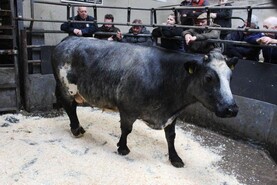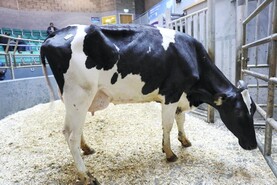We would have once thought of lungworm (hoose) as a problem mainly affecting calves in their first grazing season. However, we are now seeing hoose problems in all ages of cattle. We are also seeing it earlier in the year than usual.
Calves are now generally well dosed during their first summer at grass. In fact, they may be too well dosed, to the extent that they don’t develop natural immunity to lungworm. This makes them susceptible to infection when they are turned out for their second grazing season, when they may not be dosed as regularly.
One of our farmers who finishes bulls had this issue last autumn. Bulls he had bought in developed severe respiratory disease and some died as a result. As shed space was limited, these were being kept on a small paddock near the yard. Post-mortem revealed large numbers of lungworms in the windpipe. We suspect these bulls had been dosed very frequently as calves and therefore had no immunity to lungworm. When exposed to large numbers of larvae on the pasture, they succumbed to disease quickly. Strategic dosing and pasture management were needed to bring this outbreak under control.
We are also seeing hoose more often in adult cows. This is due to a re-infection syndrome. When cattle swallow lungworm larvae, they develop a short-term gut immunity. These larvae travel to the lungs and mature to adult lungworms. The lungs develop a long-lasting immunity to adult lungworm. This works fine if cows are continuously exposed to small numbers of lungworm larvae. However, if a cow is suddenly exposed to large numbers of lungworm larvae, these will travel to the lungs where there can be an overwhelming immune response. This can lead to severe respiratory disease in these animals. Dairy cows will have reduced milk yield as a result.
This year, we are seeing hoose problems earlier than usual. This is due to the warm weather in April and May, combined with wet conditions which allow the parasites to thrive. If you suspect an issue with lungworm in your herd, speak to your vet about diagnosis and treatment. Faecal egg counts are a useful method of diagnosing parasite problems, and a modified technique will detect lungworm larvae. This method is not as reliable in adult cattle, and other methods such as bulk milk testing or lungwashes can be useful.
*Mark Drought works at Avondale Vet Clinic Arklow, Co Wicklow. Avondale Vet Clinic is part of XLVets. XLVets is a group of progressive practices working to achieve a better future for veterinary. Visit xlvets.ie






 This is a subscriber-only article
This is a subscriber-only article










SHARING OPTIONS: